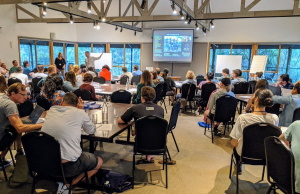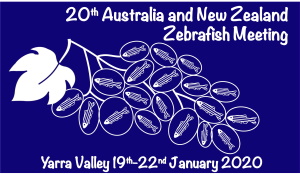Australia and New Zealand Zebrafish Meeting
Conference Organisers: Dr Patricia Jusuf, Dr Tamar Sztal, Dr Seb Dworkin, Dr Andrew Cox
The 20th Australia and New Zealand Zebrafish Meeting was held at the beautiful Yarra Valley Estate, in Melbourne’s Yarra Valley, on the 19th of January, 2020. Founded in 1999 in Melbourne, the Australia and New Zealand Zebrafish Meetings are the premier forum for the exchange of new ideas, presentation of research outcomes, discussion of emerging technologies and forging of collaborations for the Australian and New Zealand Zebrafish research communities. In recent years there has been a striking global expansion in zebrafish research and Australia and New Zealand have been a part of this remarkable global growth, with the addition of 19 new research groups in the past five years. This brings the Australia/New Zealand zebrafish community to more than 30 research groups, a number that does not include those labs that have traditionally used other model organisms but are beginning experiments using zebrafish.
 This biennial conference took place in January 2020, prior to the Covid-19 pandemic and fortunately, we were able to meet face-to-face. During the four-day conference, 97 researchers, including graduate students and post-doctoral researchers gave presentations on their latest discoveries. Research topics presented ranged from zebrafish models of liver regeneration, dissection of autism, inflammatory cell migration, visual function to investigating causes of muscle disease. Our schedule also included a recently expanded repertoire of aquatic systems including new and exciting research on Medaka and Killifish models. A highlight of the meeting were the plenary talks from leading international zebrafish researchers. Associate Professor John Rawls from Duke University, USA elaborated on his research uncovering pathways that regulate intestinal epithelial identity. He reported on how his lab leverages complementary zebrafish and mouse models to discern how cellular identity and responsiveness of epithelial cells to the milieu of dietary nutrients, xenobiotics and microbes in the intestinal environment are transcriptionally regulated. The second plenary talk was from Associate Professor Caren Norden from the Instituto Gulbenkian de Ciência, Portugal. She explained how the retina is formed from the immature optic cup shape and the signalling pathways involved in its differentiation. She demonstrated how a combination of elegant in vivo imaging studies, mechanobiology and theoretical modelling allows her lab to identify how signalling cascades and mechanical forces interact during organogenesis.
This biennial conference took place in January 2020, prior to the Covid-19 pandemic and fortunately, we were able to meet face-to-face. During the four-day conference, 97 researchers, including graduate students and post-doctoral researchers gave presentations on their latest discoveries. Research topics presented ranged from zebrafish models of liver regeneration, dissection of autism, inflammatory cell migration, visual function to investigating causes of muscle disease. Our schedule also included a recently expanded repertoire of aquatic systems including new and exciting research on Medaka and Killifish models. A highlight of the meeting were the plenary talks from leading international zebrafish researchers. Associate Professor John Rawls from Duke University, USA elaborated on his research uncovering pathways that regulate intestinal epithelial identity. He reported on how his lab leverages complementary zebrafish and mouse models to discern how cellular identity and responsiveness of epithelial cells to the milieu of dietary nutrients, xenobiotics and microbes in the intestinal environment are transcriptionally regulated. The second plenary talk was from Associate Professor Caren Norden from the Instituto Gulbenkian de Ciência, Portugal. She explained how the retina is formed from the immature optic cup shape and the signalling pathways involved in its differentiation. She demonstrated how a combination of elegant in vivo imaging studies, mechanobiology and theoretical modelling allows her lab to identify how signalling cascades and mechanical forces interact during organogenesis.
Alongside the stimulating research discussions and presentations, attendees enjoyed a number of social activities. We experienced scavenger hunts, wild life and garden tours and late-night karaoke, where people had the opportunity to show off their singing and improvisation skills. The meeting would not have been possible without support from our generous sponsors (Tecniplast, Leica Microsystems, Company of Biologists, SDR Scientific, IDT, Fujifilm Visualsonics, Coherent Scientific, Viewpoint, Zantiks and Gene Tools), many of whom have been sponsoring the meeting since its inception.
During the closing ceremony of the conference, the “best presentation” winners were announced. Dr Kazuhide Okuda won the best-postdoctoral talk, in which he presented some amazing imaging of angiogenesis and detailed his work on vascular morphogenesis and regeneration. Maya Wilde won the best student presentation, and shared her work on auditory processing in zebrafish models of neurological disease. The best poster presentation was won by Jascinta Santavond who presented her work identifying factors mediating disassembly of apoptotic cells. All winners received a certificate and cash prize.
We thank all of the attendees and look forward to the 21st Australia and New Zealand Zebrafish Meeting meeting in 2022.




